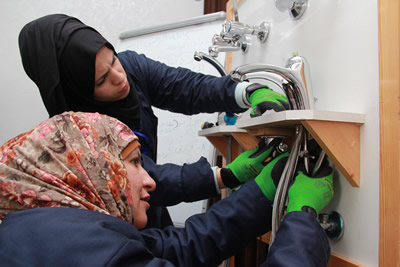The exhibition illustrates the contributions that migrant and refugee entrepreneurs make in their new communities and their home countries.
With an estimated 272 million international migrants in the world today, migration has the potential to significantly improve the wellbeing and socioeconomic conditions of migrants and their families, as well as the development prospects in receiving and sending communities, provided it occurs in an informed manner and within a transparent and rights-based regulative environment.
On 18 November, the International Organization for Migration (IOM), UNCTAD and UNHCR launched the Global Photo Exhibition on Migration and Entrepreneurship at the Palais des Nations in Geneva, Switzerland. The exhibition, which runs through 24 November, illustrates the contributions that migrant and refugee entrepreneurs make in their new communities as well as those they come from.
“At a time when international migration and refugee flows are stirring up fear and even being the target of hatred, we have joined forces to build a narrative based on facts to show the positive social, cultural and economic contributions that migrants and refugees make to their home and host countries,” said UNCTAD Deputy Secretary-General Isabelle Durant.

The exhibition was preceded by a global competition that received over 80 contributions from every region. These contributions mirror the diversity of migrant and refugee entrepreneurs in terms of the size of their enterprises, which can range from micro-businesses to medium or large-scale enterprises, as well as geographical and skills diversities.
“The exhibition is an opportunity to show the diversity of migrant and refugee economic contributions to the communities they live in and those they come from in a variety of industries, and across the globe,” said Renate Held, director of the IOM department of migration management.
“It builds on the work of IOM, UNHCR and UNCTAD on a policy guide on entrepreneurship for migrants and refugees. IOM continues to support migrant entrepreneurship in partnership with UN agencies, governments, civil society and the private sector,” she added.
The tripartite inter-agency collaboration was initiated with the policy guide that was launched during the Global Entrepreneurship Week in 2018. Later the same year, IOM and UNCTAD organized a migration and entrepreneurship competition, which selected three migrant entrepreneurs for tailor-made mentoring.
“Promoting entrepreneurship and economic inclusion enable refugees to provide for themselves and their communities and contribute to preparing them for solutions whenever available," said Mamadou Dian Balde, deputy director of UNHCR's division of resilience and solutions.
“The Global Compact on Refugees adopted last year calls for policies that include refugees and help them live in harmony, with the populations hosting them. We witness in several parts of the world refugee entrepreneurs who contribute to local economies,” he added.
The exhibition was attended by the ambassadors of Morocco and Uganda, Omar Zniber and Christopher Onyanga Aparr, as well as documentary photographer Thana Faroq and Remi Langlois from 111-Days Association Art for Refugees.


